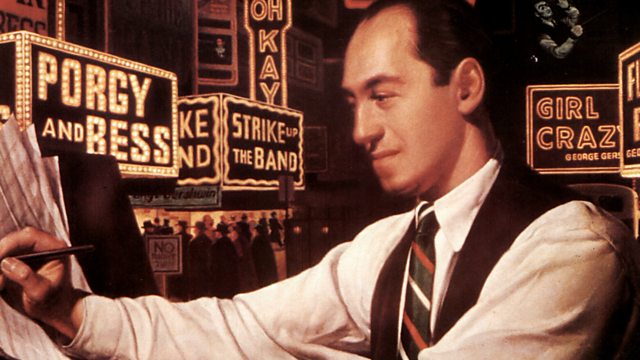
Anyone for Tennis?
Donald Macleod explains how George Gershwin discovered writing music for Hollywood films could be a frustrating business.
Donald Macleod explores the life and music of George Gershwin. Today Gershwin discovers writing music for Hollywood films can be a frustrating business.
A life cut short, George Gershwin died in 1937 of a brain tumour at the age of just 38. Yet this isn't a story of what might have been. Gershwin's musical legacy stands as one of admirable achievement. He wrote a string of twelve Broadway musicals, orchestral music and an opera. He penned some of the most recorded tunes in the popular song catalogue of all time. We'll hear many of them across the week, in classic versions made by some of the twentieth century's legendary voices, including Frank Sinatra, Ella Fitzgerald, Sarah Vaughan, Louis Armstrong, Fred Astaire and Judy Garland. Outside the sphere of popular music, Gershwin's orchestral music won plenty of public support although his critical reception was mixed. Nonetheless among his supporters were significant figures in the classical world such as the New York Philharmonic's Walter Damrosch.
Despite the breadth of his appeal, his professional standing and his wealth, Gershwin remained a man who never felt truly confident in his own musical knowledge, perhaps because his musical education had been limited by circumstance. He was born in 1898 in New York, the second son of Jewish immigrant parents, Morris and Rose Gershowitz. As a child George excelled on roller-skates rather than school-work. Leaving altogether at the age of 14 he was pounding away on a piano in Tin Pan Alley for 10 hours a day. Success came early though when he persuaded Al Jolson to record his song "Swanee". The two million records it sold made George a comfortable pile, and from there on, as they say, "the rest is history".
Signed up by RKO pictures, Gershwin moved to the West Coast in 1936. In typical workaholic fashion he immediately set to work, producing simultaneously music for the Astaire vehicle "Shall We Dance?" and another picture with Astaire "A Damsel in Distress". Gershwin was happy to embrace the lifestyle, enjoying a hectic social calendar full of dinners and parties at the homes of producers, stars and songwriters. Arnold Schoenberg was a neighbour, and soon came round on a regular basis to play tennis with him. Even so, Gershwin began to get restless, and there was talk of making a return to Broadway, a string quartet, a symphony or even a ballet.
Promenade (Shall We Dance?) - arr. Sol Berkewitz, adaptation by Paul Rosenbloom and John Fullam
John Fulham, clarinet
Buffalo Philharmonic Orchsetra
JoAnn Falletta, conductor
Suite from A Damsel in Distress
The New Princess Theater Orchestra
John McGlinn, conductor
Shall We Dance? (Shall We Dance?) - arr. & orch. Herbert Spense, Fud Livingstone, Robert Russell Bennett
Fred Astaire
The RKO Radio Studio Orchestra
Nathaniel Shilkret, conductor
Second Rhapsody
Howard Shelley, piano
Philharmonia Orchestra
Yan Pascal Tortelier, conductor
Arr. & Orch. Sy Oliver, Axel Stordahl
I Got Rhythm (Girl Crazy)
Judy Garland
Mickey Rooney
Six Hits and a Miss
The Music Maids
Hall Hopper
Trudy Erwin
Bobbie Canvin
Tommy Dorsey and his Orchestra
Cuban Overture
New Zealand Symphony Orchestra
James Judd, conductor
'S Wonderful (Funny Face)
Audrey Hepburn
Fred Astaire
Orchestra conducted by Adolph Deutsch.
Last on
Music Played
-
![]()
George Gershwin
Promenade (Walking the dog)
Orchestra: Buffalo Philharmonic Orchestra. Conductor: JoAnn Falletta.- Naxos: 8559750.
- Naxos.
- 3.
-
![]()
George Gershwin
A Damsel in distress
Orchestra: New Princess Theater Orchestra. Conductor: John McGlinn.- EMI:CDC 7479772.
- EMI.
- 1.
-
![]()
George Gershwin
Shall We Dance
Singer: Fred Astaire. Orchestra: RKO Orchestra. Conductor: Nathaniel Shilkret.- TCM: 821558 2.
- TCM.
- 17.
-
![]()
George Gershwin
Rhapsody no 2
Performer: Howard Shelley. Orchestra: Philharmonia Orchestra. Conductor: Yan Pascal Tortelier.- Chandos: Chan 9092.
- Chandos.
- 2.
-
![]()
Judy Garland, Henry Kruze, P. Hanna, G. Mershon, Stanton, Ernie Newton, Tommy Dorsey & MGM Studio Chorus
I got rhythm
- GIRL CRAZY.
- PREMIER SOUNDTRACKS.
- 1.
-
![]()
George Gershwin
Cuban overture
Orchestra: New Zealand S O. Conductor: James Judd.- Naxos 8.559107.
- Naxos.
- 3.
-
![]()
Fred Astaire, Audrey Hepburn & Adolph Deutsch And His Orchestra
'S Wonderful
- Funny Face (Original Soundtrack Recording -Paramount pictures).
- 12.
Broadcasts
- Thu 2 Jun 2016 12:00���˿��� Radio 3
- Thu 2 Jun 2016 18:30���˿��� Radio 3
Beethoven Unleashed – the box set
What was really wrong with Beethoven?
Composers A to Z
Who knew? Five eye-opening stories from Composer of the Week
Five reasons why we love Parry's Jerusalem
What is the strange power of Jerusalem which makes strong men weep?
A man out of time – why Parry's music and ideas were at odds with his image...
The composer of Jerusalem was very far from the conservative figure his image suggests.
Composer Help Page
Find resources and contacts for composers from within the classical music industry.





